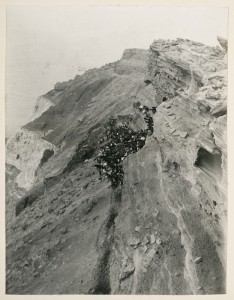Mr Peacock’s Possessions: sources and background reading
NB THIS PAGE IS UNDER CONSTRUCTION!
As noted in the book, the most important sources for Mr Peacock’s Possessions were:
Elsie K Morton Crusoes of Sunday Island, 1957.
Steven Gentry, Raoul & the Kermadecs: New Zealand’s Northernmost Islands, Steele Roberts, 2013.
Margaret Pointer, Niue 1774-1974: 200 years of contact and change, Otago University Press, 2015.
SOAS London Missionary Society Archives
What follows now is not exactly a bibliography, and is for myself as much as anyone else – a way to get my reading over the last three years in some order, and add new material as I come across it, as I have for my other novels. I don’t feel any great need to ‘burnish my credentials‘! But others may also be interested, so here, more or less, is what’s influenced me in my thinking and writing about this book, and where I’ve found out most of what I needed to know.
Online sources:
Te Ara : The Encyclopedia of New Zealand - Kermadecs section here
New Zealand Electronic Text Collection – Te Pūhikotuhi o Aotearoa, part of Victoria University of Wellington Library
The Alexander Turnbull Library Collections – including the WRB Oliver photograph album of the 1908 Scientific expedition to the Kermadecs.

Goats on steep terrain, Raoul Island. Oliver, Walter Reginald Brook, 1883-1957  hotograph album of Kermadec Islands Expedition 1908. Ref: PA1-q-135-29-2. Alexander Turnbull Library, Wellington, New Zealand. /records/22742380
hotograph album of Kermadec Islands Expedition 1908. Ref: PA1-q-135-29-2. Alexander Turnbull Library, Wellington, New Zealand. /records/22742380
Raoul and the Kermadecs
Kermadec: Art Across the Pacific, Pew Charitable Trusts, 2013
Niue, Polynesia, Oceania
Niue: A History of the Island, written by the leading citizens of the country itself, published jointly by the Institute of Pacific Studies of the University of the South Pacific & the Government of Niue (dual language), 1982
Basil C Thomson, Savage Island: An Account of a Sojourn in Niue and Tonga, London, John Murray, 1902
1982
‘Our Sea of Islands’ by Epeli Hau’ofa, in A New Oceania : Rediscovering our Sea of Islands, co-edited by Hauʻofa, Vijay Naidu and Eric Waddell, 1993
Marshall Sahlins, What ‘Natives’ Think: About Captain Cook, For Example, Chicago, 316 pp, £19.95, July 1995
We, the navigators: The Ancient Art of Landfinding in the Pacific, David Lewis, University of Hawaii Press, Honolulu, 1972, 1994
Nainoa Thompson, On Wayfinding (Hawaiian voyaging traditions)
Nicholas Thomas, Islanders: The Pacific in the Age of Empire, Yale University Press, 2010
Mystery Islands of South Polynesia
H. Stonehewer Cooper, Coral Lands, 2 vols London, 1880
Missionaries
Slavery and Migration
European pioneers and settlers
Charles Hursthouse, New Zealand, or Zealandia, The Britain of the South in 2 vols
Susanne Williams Milcairns, Native Strangers: Beachcombers, Renegades and Castaways in the South Seas, NZ, Penguin, 2006.
Sidney J Baker, New Zealand Slang: A Dictionary of Colloquialisms (‘The first comprehensive survey yet made of indigenous English speech in this country – from the argot of whaling days to children’s slang in the twentieth century’), Whitcombe and Tombs Ltd, 1940
(‘Our ways are less crowded, our gardens apacious, our horizons vast. We are people of wide spaces, of keen winds, of turbulent seas. We are of the Pacific, with its blue skies and towering white cumulus clouds, and the earth is not yet tamed beneath our feet… Our bush is greener, vaster, more silent than any English wood; our countryside less intimate; nearly always moutain ranges stand on the edge of our horizons…We are not enclosed by the dun-coloured bricks of English cities, but are breathing fresh air and carrying freedom on our shoulders, away from the smoke-dust and hopeless streets of English slums…From the earliest days, from about 1794, when the first whaling fleets arrived, the conditions of New Zealand have necessitated the finding of new words so that new concepts can be understood between man and man.’)
G.B.Earp Hand-book for intending emigrants to the Southern Settlements of New Zealand, 3rd edition, London: Routledge & Co, 1852 ‘The intention of this little work is to awaken the middle and labouring classes of this country to a sense of their own position with repsect to the future, as regards this country, and, at the same time, to point out to them the way to escape from that future, whilst they have either small capital or strength to labour left. There is no apparent way whereby to escape from impending evil, but by emigrating.’
Coral Lands, 1880
Islands and Island Fiction
Island Studies Journal, an open access scholarly journal dedicated to the interdisciplinary study of our ‘world of islands’
Godfrey Baldacchino, ‘Studying Islands: On Whose Terms? Some Epistemological and Methodological Challenges to the Pursuit of Island Studies’, ISJ Vol. 3, No. 1, 2008, pp. 37-56



